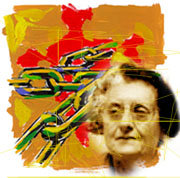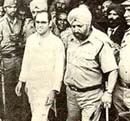Indira Gandhi and her advisers were surprised by the ease with which
they could silence democracy
 Indian democracy lay in serious jeopardy in the summer of 1975 as Indira Gandhi's Emergency destroyed the country's democratic framework. Fortunately, that long's day journey into the night ended in March 1977 with a Janata Party triumph and the restoration of democracy. K R Sundar Rajan -- then an assistant editor at The Times of India who was imprisoned during the Emergency -- reflects on the darkest hour in fifty years of freedom.
Indian democracy lay in serious jeopardy in the summer of 1975 as Indira Gandhi's Emergency destroyed the country's democratic framework. Fortunately, that long's day journey into the night ended in March 1977 with a Janata Party triumph and the restoration of democracy. K R Sundar Rajan -- then an assistant editor at The Times of India who was imprisoned during the Emergency -- reflects on the darkest hour in fifty years of freedom.
Twenty years ago the Indian people voted decisively
to defeat the hated regime of Prime Minister Indira Gandhi which
had clamped a state of Emergency and sent democracy
to jail. That such a bloodless revolution in the case of freedom
could succeed seemed impossible when a confident Indira Gandhi ordered
elections on January 18, 1977. On March 25, Morarji Desai, the
new prime minister, was installed amidst great rejoicing.
It is frightening even to contemplate what would have happened
if Indira Gandhi had won. The Emergency would have continued, deepening
public discontent and leading to a violent confrontation between
the government and sections of the restive population. The
Emergency, proclaimed on June 26, 1975 had lasted 21 months --
-- to deal with what Indira Gandhi described as
the "threat of lawlessness and anarchy."
In fact, the
country was at peace, the only threat was to her own position.
The judgment of the Allahabad high court had disqualified
her from continuing as prime minister. She was held guilty of
corrupt practices during her election campaign and the Emergency
was a cynical device to perpetuate her hold on the government.
When the Congress party was defeated in the March 1977 elections,
a mood of self-congratulation swept the nation. Politicians who
were released and newspapers which were subjected
to censorship said the verdict of the ballot box showed
the inner vitality of Indian democracy. A familiar comment was
that the Emergency was destined to fail sooner rather than later.
However, when the Emergency was clamped, when tens of thousands
of people were thrown into prison and when Parliament and the
courts were made ineffective, few people really thought that the
nightmare would end so smoothly. It is therefore necessary for
concerned Indians to do some genuine heart-searching and consider
why their democratic system was subverted by a small coterie of
politicians. Could this happen again?
 The most shameful aspect of the Emergency was not its imposition
but the manner in which almost the whole country succumbed to
it and accepted it meekly. "Not a dog barked," Indira Gandhi
said later. Sadly, this was true. Less than half a dozen newspapers
denounced the action. A few judges and lawyers protested.
The most shameful aspect of the Emergency was not its imposition
but the manner in which almost the whole country succumbed to
it and accepted it meekly. "Not a dog barked," Indira Gandhi
said later. Sadly, this was true. Less than half a dozen newspapers
denounced the action. A few judges and lawyers protested.
As Soli Sorabjee, an eminent constitutional expert and later attorney
general of India, noted that the performance of the Supreme Court as
a guardian of fundamental rights was deplorable. M A Rane, a leading
advocate, noted with sadness that the highest court in the land
had failed the people in their hour of trial when the entire country
was turned into a prison house.
Indira Gandhi and her advisers were surprised by the ease with which
they could silence and subjugate democracy. As one of her principal
cronies told me later, it was feared that there might be considerable
resistance by Opposition parties backed by the intelligentsia
and sections of the politically conscious public. The police all over
the country were alerted to expect disturbances. Instead, there
was an explosion of sycophancy.
Some 50 newspaper editors went
in a procession to the prime minister's house -- not to protest
against the press censorship but to complain that the censorship
was not strict enough to prevent 'counter-revolutionaries'
from having their way. The usually fire-eating trade unions behaved
as if they had suddenly ceased to exist.
It is nobody's case that when the Emergency was imposed the whole
country should have risen in protest. Well, such a thing did not
happen even during the freedom struggle against the British. After
all, the Quit India movement in 1942 lost its intensity within a
year, even though Mahatma Gandhi, Jawaharlal Nehru, Sardar Patel
and thousands of nationalists remained locked up in prisons across
the country. The British government claimed that the movement
had petered out. This was not true. The real point is that a people
who put up such a brave fight against foreign rule surrendered
to Indira Gandhi's Emergency like a flock of sheep.
There was, of course, fear bordering on panic. Under the lawless
law called the Maintenance of Internal Security Act, MISA, anyone
could be detained indefinitely without the right to appeal to
courts. Bureaucrats and policemen struck terror on a scale witnessed
only during the worst phases of British rule. But this does not
entirely explain why the Emergency appeared to many people as
a development which did not call for a spirited counter-attack.
Outside the opposition, there was little positive
concern that the whole democratic system had been crushed.
The harsh truth is that the people had become utterly cynical
about freedom and democracy. The glow of nationalistic fervour which
one saw during foreign rule was missing. When the British were
ruling even humble citizens, including government servants, showed
their patriotism by wearing khadi (hand-spun) clothes. In short,
Indira Gandhi had outlawed the Constitution, it had become
a meaningless document to most people. It was just not worth defending.
Indira Gandhi and her party did fear some resistance to the Emergency.
But there were people around her, chiefly her son Sanjay, who
were certain that outside the opposition parties defiance would
be nominal and could be taken care of. And this is exactly what happened.
Throughout the Emergency, there were very few instances
of organised resistance. This further convinced the Emergency
regime that it was free to do anything, including forced
sterilisation and uprooting of poor people from slums in the name
of planned development. This also explains why Indira Gandhi went
in for elections so confidently. She and her advisers did not
have any doubt that the electorate would massively vote for the
Congress, thus legitimising the Emergency in a big way.
 Twenty years after the defeat of Indira Gandhi's dictatorship,
can we say with confidence that useful lessons have been learnt
from the episode and that democracy in India is absolutely safe?
I am afraid that the answer cannot be a categorical 'yes'. In
fact, surveys made by newspapers and magazines show that a majority
of people have emerged as the most despised class.
Twenty years after the defeat of Indira Gandhi's dictatorship,
can we say with confidence that useful lessons have been learnt
from the episode and that democracy in India is absolutely safe?
I am afraid that the answer cannot be a categorical 'yes'. In
fact, surveys made by newspapers and magazines show that a majority
of people have emerged as the most despised class.
Indira Gandhi imposed the Emergency to counter Jayprakash Narayan's
movement which had as its objectives a good government and the removal
of corruption. By good government he meant real democracy. Today,
political parties only pay lip service to democracy, while corruption
has become rampant.
An Emergency of the kind Indira Gandhi declared will not go down
well with the people of India. But they do yearn for a more honest,
principled and effective democratic system. This is still to be
achieved and the prospects are by no means bright.
Illustration: Dominic Xavier
| 
